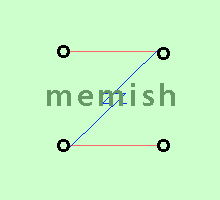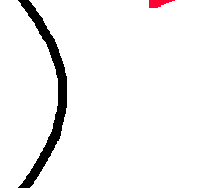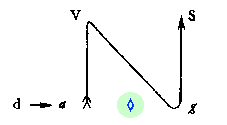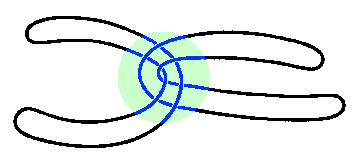|
Préface additionnelle Juin 2000 Le concept de Semblant - traduisible en anglais en Semblance,
ou Seeming - s'avère fort important pour la psychanalyse et dans
son histoire. Car, pour le moins, il coïncide avec la conception du
terme de Meme, initialement inventé en génétique, puis étendu
dans le domaine de l'intelligence artificielle. Son travail initié par
Lacan et réalisé par Verdiglione dans le champ psychanalytique
justifie donc une observation spéciale. Ainsi trouvons-nous: |
![]() The
reason for PLAN appears clearly when starting with a wide angle view.
The
reason for PLAN appears clearly when starting with a wide angle view.
![]() We
are living in a time where we begin to calculate ideas - thoughts
become things as we approach a realization of Artificial Intelligence.
We
are living in a time where we begin to calculate ideas - thoughts
become things as we approach a realization of Artificial Intelligence.
![]() Perhaps
things will also become thoughts after such realization. For the moment we
just begin to calculate... something similar to a Center of Mass
in objects ; it is called Meme in ideas, thoughts and other complex
systems.
Perhaps
things will also become thoughts after such realization. For the moment we
just begin to calculate... something similar to a Center of Mass
in objects ; it is called Meme in ideas, thoughts and other complex
systems.
There is a riddle to draw
a graph
A life model which allows information in agents to change as a result
of social
interactions is a "memish" sort of model, though the word "meme" may
appear nowhere in the discussion of the model
In the memish
 riddle
riddle![]()
One obviously recognizes Lacan's mathem :

This is not the end of the riddle yet.
The riddle says: the word may appear nowhere
and this is the answer :
With Psychoanalysis the word appears now
here

There is (in blue) what
Lacan calls the
Awl and/or the hole
that hallmark does.
This blue lozenge carries the loose edge
that is the meme (re social interaction above)
![]()
The word 'meme' - as me, may never been said (unless
I name my name)
for it is the punctual center of mass of the Word - aka Significand; noun,
name, verb etc...
Human history shows a constant attempt for
naming the center of its collective psychology,
the mobile of his crowd, the cause of its masses.
Passing many variations (religion, obsession, hysteria)
these attempts eventually cause an industry
which builts an Artificial Intelligence.
Similarly, mathematics attempt to formulate the meme,
that they may naturalize, finally, with a specialty
close to topology that is the logic of knots.
From its beginning. it is a topology which shows its relevance in regards
with meme.
Is is quite well exemplified as two strings cross.

In a special and primitive knot, two strings
crossing/hook each one another;
reciprocally create a certain point.
Such point is a meme - it does not belong to any of the strings, nor
to both
(if one take off one string, the other get loose and
none show any point)
It is a kind of virtual point - so that I may call a meme meme
and even name this meme-meme meme, and meme-meme-meme meme, memetc...
It can last my whole life
until I realize that's me,
the Freudian ego that's me.
Here is Freud's graph showing the transference position of the meme that Freud called ego
Of course, it is there where Lacan saw the awl's
hole mark,
there one see two other graphs where Lacan designated the meme.

|
Lacan's awl |

|
This is the beginning of a presentation
& description of PLAN,
it shows meme 's early conceptualization by psychoanalysis,
i.e., within linguistic model.
NOTE : this is just a sketch for what a sound tolopogy of knot
currently develops - if it does not clearly help you to get the idea, please
write cybek for further references.
To continue PLAN's
description
or
|
|
NOTE : this is why the riddle says : the word "meme" may appear nowhere - as history/facts shows it - Dawkin's who coined the word meme lets nowhere appears the Name it is (namely the Name of the Father) and his followers continue the same tradition (in order to investigate this deeply, a correspondence details the argument) <back>
© CYBEK of New York, 1999.